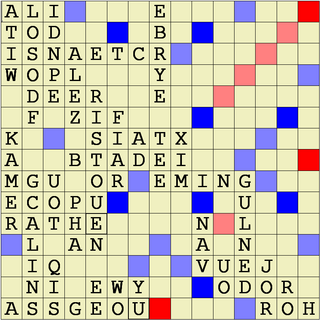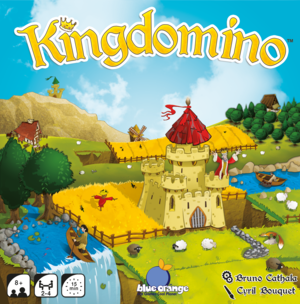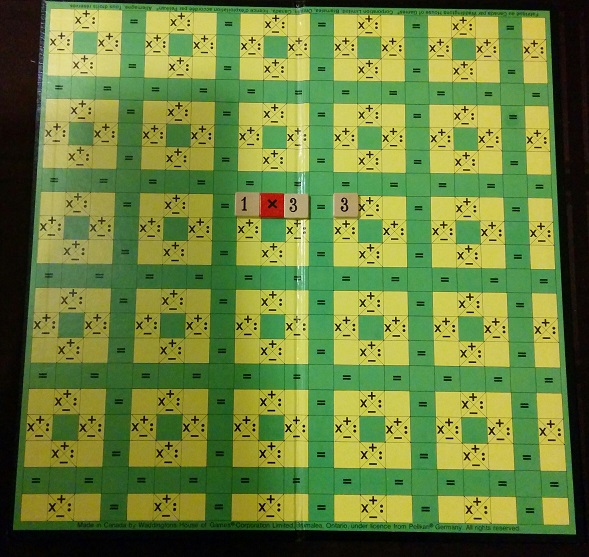
Upwords is a board game invented by Elliot Rudell and originally published by the Milton Bradley Company, now a division of Hasbro. The game remains under license to Hasbro by Rudell Design, LLC. Upwords is similar to Scrabble, or Words With Friends, in that players build words using letter tiles on a gridded gameboard. The point of difference is that in Upwords letters can be stacked on top of other letters already on the gameboard to create new words. The higher the stack of letters, the more points are scored. This typically makes words built in later turns of the game more valuable than earlier words, increasing play intensity and adding a level of strategy unique to Upwords. The memorization of two-letter words is considered a useful skill in this game.
Anagrams is a tile-based word game that involves rearranging letter tiles to form words.

Boggle is a word game designed by Bill Cooke, invented by Allan Turoff and originally distributed by Parker Brothers. The game is played using a plastic grid of lettered dice, in which players attempt to find words in sequences of adjacent letters.

Editions of the word board game Scrabble in different languages have differing letter distributions of the tiles, because the frequency of each letter of the alphabet is different for every language. As a general rule, the rarer the letter, the more points it is worth.

Super Scrabble is a board game introduced in 2004 and a variant of Scrabble. It is played on a 21×21 grid board instead of Scrabble's usual 15×15, and uses twice as many letter tiles.
Kotoba no Puzzle: Mojipittan is a series of Japanese word puzzle video games designed by Hiroyuki Goto and produced by Namco. The series began as an arcade game but since then has been made available for the Sony PlayStation 2 (PS2), the Nintendo Game Boy Advance (GBA), the Sony PlayStation Portable (PSP), the Nintendo DS, the Wii via WiiWare and phisically, and the Nintendo DSi via DSiWare.

Scrabble variants are games created by changing the normal Scrabble rules or equipment.
Equate is a board game made by Conceptual Math Media where players score points by forming equations on a 19x19 game board. Equations appear across and down in a crossword fashion and must be mathematically correct. It is similar to Scrabble except players use digits and mathematical operators instead of letters.
Word Up also known as Word Soup is a popular SWP game. Located on the itbox and other terminals, the game was developed by Big Fizz Games.
Francophone Scrabble, or French-language Scrabble, is played by many thousands of amateurs throughout the world and the Fédération internationale de Scrabble francophone has more than 20,000 members. Just as in English, points are scored by playing valid words from the lettered tiles. In French there are 102 tiles - 100 lettered tiles and two blanks known as jokers. The official word list for Francophone Scrabble is L'Officiel du jeu Scrabble.
mi×ma+h is a Canadian board game developed by Wrebbit and published in 1987. It resembles a variant of Scrabble in that tiles are placed on a crossword-style grid, with special premiums such as squares that double or triple the value of a tile and a 50-point bonus for playing all seven tiles on the player's rack in one turn. Unlike Scrabble, Mixmath uses numbered tiles to generate short equations using simple arithmetic. Wrebbit, maker of Puzz-3D jigsaw puzzles, has since been taken over by Hasbro, and it appears that Mixmath has been discontinued.

Tile tracking is a technique most commonly associated with the game of Scrabble and similar word games. It refers to the practice of keeping track of letters played on the game board, typically by crossing letters off a score sheet or tracking grid as the tiles are played. Tracking tiles can be an important aid to strategy, especially during the endgame when there are no tiles left to draw, where careful tracking allows each player to deduce the remaining unseen letters on the opponent's final rack. The marking off of each letter from a pre-printed tracking grid as the tiles are played is a standard feature of tournament play.
Lexulous is an online word game based on the commercial board game Scrabble. It is run by an Indian company of the same name on a dedicated website, and is also available within the social networking site Facebook.

Bananagrams is a word game invented by Abraham Nathanson of Pawtucket, Rhode Island, wherein lettered tiles are used to spell words.
Algebra tiles are mathematical manipulatives that allow students to better understand ways of algebraic thinking and the concepts of algebra. These tiles have proven to provide concrete models for elementary school, middle school, high school, and college-level introductory algebra students. They have also been used to prepare prison inmates for their General Educational Development (GED) tests. Algebra tiles allow both an algebraic and geometric approach to algebraic concepts. They give students another way to solve algebraic problems other than just abstract manipulation. The National Council of Teachers of Mathematics (NCTM) recommends a decreased emphasis on the memorization of the rules of algebra and the symbol manipulation of algebra in their Curriculum and Evaluation Standards for Mathematics. According to the NCTM 1989 standards "[r]elating models to one another builds a better understanding of each".

Words with Friends is a multiplayer word game developed by Newtoy. Players take turns building words crossword puzzle style in a manner similar to the classic board game Scrabble. The rules of the two games are similar, but Words with Friends is not associated with the Scrabble brand. Up to 30 games can be played simultaneously using push notifications to alert players when it is their turn. Players may look up friends either by username or through Facebook, or be randomly assigned an opponent through "Smart Match". Players can also find potential opponents using Community Match.

Scrabble Showdown was an American game show created for the American cable network The Hub. The program was based on the board game Scrabble and was hosted by Justin Willman. It ran from September 3, 2011, to April 15, 2012.
Café International is a 1989 board game created by Rudi Hoffmann It is a simple game for 2 to 4 players in which the players take on the role of waiters in the famous "Cafe International". Their goal is to seat customers of various nationalities with other customers from the same nationality, and also to keep the numbers of men and ladies at the tables even. Café International won the Spiel des Jahres award in 1989.

Kingdomino is a 2016 board game for 2-4 players designed by Bruno Cathala and published by Blue Orange Games. In this 15-20 minute, family-oriented game, players build a five by five kingdom of oversized domino-like tiles, making sure as they place each tile that one of its sides connects to a matching terrain type already in play.












